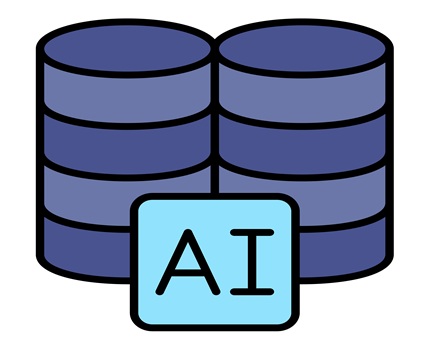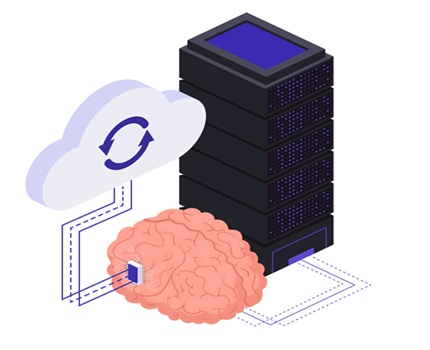Data Transformation into Vectors
Raw unstructured data such as text, images, or audio is processed by AI or machine learning models to generate vector embeddings—numerical representations capturing semantic meaning.
Experience lightning-fast queries and embedding search designed for AI applications.

An AI vector database is a specialized type of vector database designed to store and manage data represented as mathematical vectors-numerical arrays that capture the semantic meaning of complex data like text, images, or audio. Unlike traditional databases that rely on exact matching, an AI vector database for RAG and LLMs facilitates similarity searches by identifying related or contextually similar items through spatial relationships between vectors. This ability to compare data based on meaning rather than exact keywords is invaluable for powering applications like semantic search, recommendation engines, and intelligent chatbots.
The rise of AI and machine learning vector database technology has made it possible for models to "remember" and retrieve information more effectively by storing learned representations (embeddings) of data. These databases serve as the backbone for vector databases supporting LLMs and chatbots, enabling dynamic, context-aware responses and improved user experiences. Enterprises benefit through scalable, efficient storage and retrieval, making AI solutions faster and more impactful.
As an enterprise solution, AI vector databases enable large-scale AI-powered applications to perform rapid similarity queries across vast datasets, supporting use cases in e-commerce, healthcare, finance, and more. By abstracting complex data into vectors and using highly optimized search algorithms, AI vector databases unlock new capabilities for solutions that demand semantic understanding and contextual relevance.
These high-dimensional vectors are stored efficiently either in-memory for fast access or on disk for handling massive datasets, often using a hybrid approach to optimize speed and cost.
Advanced indexing algorithms like Approximate Nearest Neighbor (ANN), Hierarchical Navigable Small World (HNSW), or Product Quantization (PQ) organize vectors to enable rapid retrieval based on similarity.
User queries are converted into vectors using the same embedding models, then the vector database compares these query vectors against stored vectors to find the closest matches.
Retrieved vectors are post-processed with metadata filters and ranking algorithms to present the most relevant results tailored to the query intent.
The vector database integrates seamlessly with AI frameworks and data pipelines, allowing continuous ingestion of new embeddings and real-time updates necessary for dynamic, intelligent applications.
We're not just delivering AI infrastructure-we're your trusted AI solutions provider, empowering enterprises to lead the AI revolution and build the future with breakthrough generative AI models.

KPMG optimized workflows, automating tasks and boosting efficiency across teams.

H&R Block unlocked organizational knowledge, empowering faster, more accurate client responses.

TomTom AI has introduced an AI assistant for in-car digital cockpits while simplifying its mapmaking with AI.

AI vector databases have become increasingly important because they specialize in handling complex, high-dimensional data generated by artificial intelligence and machine learning models. Unlike traditional databases that store structured data in rows and columns, a vector database indexes vector embeddings-numerical representations of unstructured data such as text, images, and audio. This capability makes AI vector databases essential for use cases like semantic search, recommendation systems, and similarity matching, where understanding subtle contextual relationships is critical. By enabling efficient and fast retrieval of relevant information from vast datasets, these databases power cutting-edge AI applications like chatbots and large language models (LLMs) with real-time, accurate results.
Cyfuture AI offers advanced capabilities with its AI Vector Database designed to meet modern enterprise needs. This vector database solution facilitates rapid and precise similarity searches optimized for AI-driven applications like large language models (LLMs), chatbots, and recommendation engines. By efficiently handling diverse data types—text, images, audio, and more-Cyfuture's machine learning vector database enables businesses to build scalable AI solutions with ultra-low latency and high throughput.
Cyfuture AI's platform also offers seamless integration with popular AI frameworks and cloud-native ecosystems, making it an ideal enterprise vector database for powering real-time semantic search, context-aware responses, and intelligent automation. With robust security, horizontal scalability, and proprietary hybrid search capabilities, Cyfuture AI's vector database provides the performance and reliability essential for mission-critical AI workloads. This makes it a comprehensive choice for organizations aiming to accelerate innovation and deliver personalized AI experiences.

Optimized for low-latency similarity search, Cyfuture AI’s vector database delivers lightning-fast retrieval even across millions of high-dimensional embeddings.
Designed specifically for AI workloads, it efficiently stores and manages vector embeddings generated by machine learning and LLM models, enabling smoother AI inference and operations.
Seamlessly handles large-scale enterprise deployments with dynamic scaling and high availability to support mission-critical applications without performance degradation.
Enables deeper contextual insights by searching based on meaning and context rather than just keywords, powering smarter chatbots and recommendation engines.
Easily integrates with cloud-native AI pipelines, allowing rapid deployment alongside AI inference models on GPU servers within Cyfuture AI.
Implements comprehensive security measures tailored for enterprise needs, including data encryption, role-based access control, and regulatory compliance.
Offers support for popular AI and ML frameworks with REST, Python, and gRPC APIs, ensuring seamless integration into existing developer workflows.
Reduces compute and storage overhead through intelligent indexing and compression techniques, optimizing total cost of ownership.
































At Cyfuture AI, we combine advanced technology with genuine care. Our expert team is always ready to guide you through setup, resolve your queries, and ensure your experience with Cyfuture AI remains seamless. Reach out through our live chat or drop us an email at [email protected] - help is only a click away.
Cyfuture AI's vector database is an advanced AI vector database designed to store, search, and manage high-dimensional vector embeddings generated by AI models for applications such as semantic search, recommendations, and intelligent chatbots.
It enables fast similarity searches and efficient retrieval of relevant data points, accelerating workflows in machine learning by reducing the need for repetitive computations and enabling real-time inference.
Yes, it supports multi-modal data including text, images, audio, and video embeddings, making it versatile for a wide range of AI applications.
Absolutely. Cyfuture AI's vector database is built for high scalability, capable of handling billions of vectors with features like auto-sharding, load balancing, and fault tolerance.
With ultra-low latency often below 10 milliseconds for similarity searches, it supports real-time AI applications demanding immediate results.
Yes, it is designed as a vector database for LLMs, enabling enhanced contextual understanding and retrieval for natural language AI services.
Definitely. As a vector database for chatbots, it helps deliver context-aware responses by indexing conversational embeddings efficiently.
Security features include encryption, role-based access control, and compliance with standards such as GDPR and HIPAA, ensuring enterprise-grade protection.
It employs high-performance approximate nearest neighbor (ANN) algorithms like HNSW and IVF to balance search accuracy and speed at scale.
Users can create accounts on the Cyfuture AI platform, launch vector database instances easily via dashboard, and integrate with AI applications using provided APIs and SDKs.
Get started instantly and supercharge your AI workloads with Cyfuture AI.